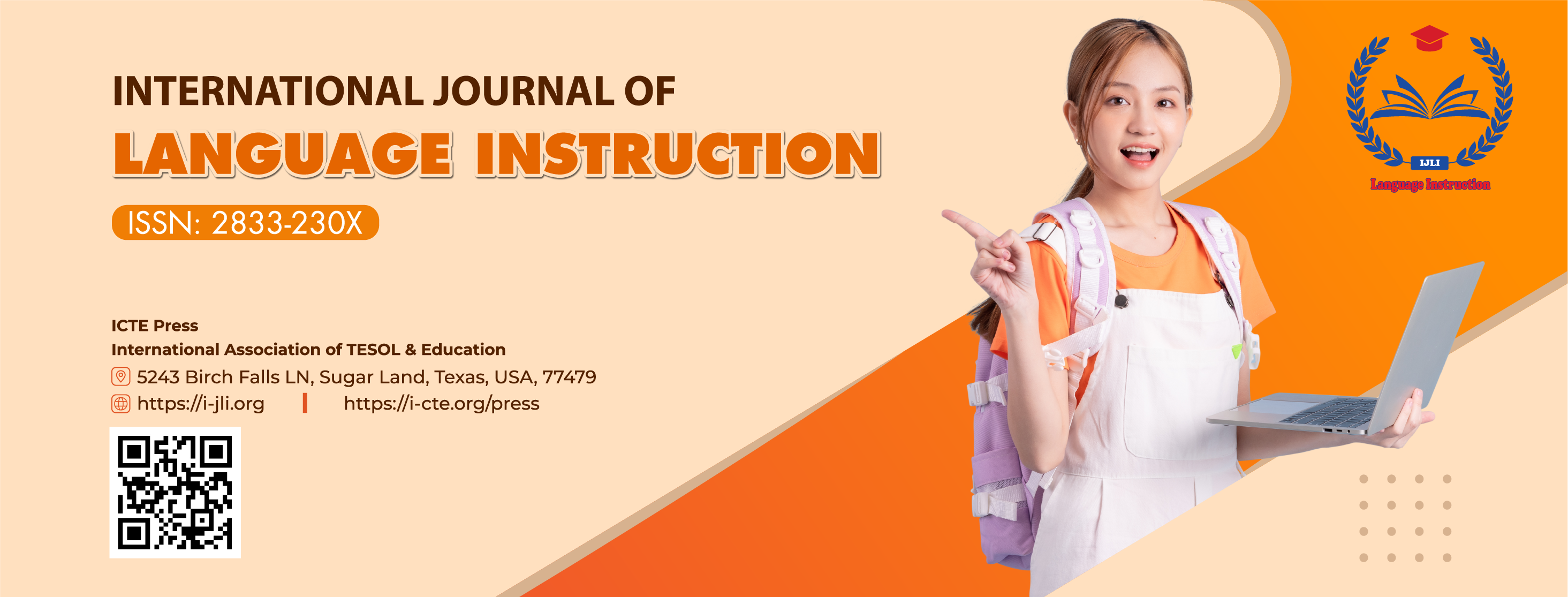Effects of Strategy-Based Instruction on Vietnamese EFL College Students’ Reading Comprehension: A Mixed Method Approach
DOI:
https://doi.org/10.54855/ijli.24314Keywords:
strategy-based instruction, reading comprehensionAbstract
Few studies have been quite successful in examining how Strategy-Based Instruction affects students' reading comprehension. However, these studies have only looked at specific reading strategies, like cognitive or metacognitive strategies, and have not used a reading instructions model to look at all phases of pre-, while-, or post-reading. To evaluate the impact of SBI, particularly the reading framework model Cognitive Academic Language Learning Approach, on EFL college students' reading comprehension, sixty EFL students at Hau Giang Community College participated. A mixed-methods approach with tests and semi-structured interviews was used. The conventional approach was used to teach reading to the Control Group, whereas SBI was used for the Experimental Group. The results show that SBI significantly improved the reading comprehension of EFL students. They also have the drive and self-assurance to develop into proficient readers on their own. Therefore, it is suggested that English reading comprehension be taught more widely using SBI.
References
Abbott, M. L. (2006). ESL reading strategies: Differences in Arabic and Mandarin speaker test performance. Language Learning, 56(4), 633–670.
Akkakoson, S. (2013). The relationship between strategic reading instruction, student learning of L2‐based reading strategies and L2 reading achievement. Journal of Research in Reading, 36(4), 422–450.
Anderson, R. C. (1985). Becoming a nation of readers: The report of the Commission on Reading. National Academy of Education.
Anderson, R. C., & Freebody, P. (1983). Reading comprehension and the assessment and acquisition of word knowledge. In B. Huston (Ed.), Advances in reading/language research (pp. 231–256). JAI Press.
Arikunto, S. (Ed.). (2009). Educational evaluation basics. Bumi Aksara.
Ary, D., Jacobs, L. C., Irvine, C. K. S., & Walker, D. (2018). Introduction to research in education. Cengage Learning.
Bachman, L. F. (1990). Fundamental considerations in language testing. Oxford University Press.
Block, C., & Pressley, M. (2002). Comprehension instruction: Research-based best practices. Guilford Press.
Boyatzis, R. E. (1998). Transforming qualitative information: Thematic analysis and code development. Sage.
Carlisle, J. F. (2000). Awareness of the structure and meaning of morphologically complex words: Impact on reading. Reading and Writing, 12(3), 169–190.
Chamot, A., Barnhardt, S., Beard El-Dinary, P., & Robbins, J. (1999). The learning strategy handbook. Addison-Wesley.
Chamot, A. U. (2005). Language learning strategy instruction: Current issues and research. Annual Review of Applied Linguistics, 25, 112–130.
Chamot, A. U., & O’malley, J. M. (1994). The CALLA handbook: Implementing the cognitive academic language learning approach. Addison-Wesley.
Chinpakdee, M., & Gu, P. Y. (2021). The impact of explicit strategy instruction on EFL secondary school learners’ reading. Sage. https://doi.org/10.1177/1362168821994157
Cohen, A. D., Weaver, S. J., & Li, T. Y. (1996). The impact of strategies-based instruction on speaking a foreign language. Center for Advanced Research in Language Acquisition.
Cohen, L., & Manion, L. (1994). Research methods in education. Routledge.
Creswell, J. W. (2003). Research design. Sage.
Duffy, G. G. (1993). Rethinking strategy instruction: Four teachers’ development and their low achievers’ understandings. The Elementary School Journal, 93(3), 231–247.
Fraenkel, J. R., Wallen, N. E., & Hyun, H. H. (2012). How to design and evaluate research in education (Vol. 7). McGraw-Hill.
Golinkoff, R. M. (1975). A comparison of reading comprehension processes in good and poor comprehenders. Reading Research Quarterly, 11(4) 623–659.
Grabe, W. P., & Stoller, F. L. (2013). Teaching and researching: Reading. Routledge.
Grellet, F. (1981). Developing reading skills: A practical guide to reading comprehension exercises. Cambridge University Press.
Hartmann, P., & Kirn, E. (2007). Interactions 2 Reading. McGraw Hill. https://books.google.com.vn/books
Huan, N. B. (2013). Beliefs about support for teacher change in English for Specific Purposes university classes. New Zealand Studies in Applied Linguistics, 19(2), 36-48.
Huynh, V. O. (2020). Effects of cognitive reading strategy teaching on EFL students’ reading comprehension at Hoa Minh upper secondary school. (Master's thesis on theory and methods of teaching English). Tra Vinh University.
Koda, K. (2007). Reading language learning: Cross-linguistic constraints on second language reading development. Language Learning, 57(1), 1–44. http://dx.doi.org/10.1111/0023-8333.101997010-il
Liu, P. Y. (2013). Taiwanese first year university EFL learners’ metacognitive awareness and use of reading strategies in learning to read: Proficiency levels and text types. University of Exeter. http://hdl.handle.net/10871/16150
Mehrdad, A. G., Ahghar, M. R., & Ahghar, M. (2012). The effect of teaching cognitive and metacognitive strategies on EFL students' reading comprehension across proficiency levels. Procedia-Social and Behavioral Sciences, 46, 3757–3763.
Meniado, J. C. (2016). Metacognitive reading strategies, motivation, and reading comprehension performance of Saudi EFL Students. English Language Teaching, 9(3), 117–129.
Nguyen, H. T. (2007). Educating Vietnamese American Students. Multicultural Education, 15(1), 23–26.
Nguyen, L. A. P., & Nguyen, T. H. B. (2024). A Study on Adult Learners of English as A Foreign Language in Vietnam: Motivations, Advantages, and Challenges. International Journal of Language Instruction, 3(1), 31–42. https://doi.org/10.54855/ijli.24313
Nguyen, T. L. P. (2022). Teachers’ Strategies in Teaching Reading Comprehension. International Journal of Language Instruction, 1(1), 19–28. https://doi.org/10.54855/ijli.22113
Nunan, D. (2003). Practical English language teaching. McGraw-hill. http://usafiles.net/23c76ca89ca89d5d
Nuttall, C. (2000). Teaching reading skills in a foreign language. Macmillan.
Olshavsky, J. E. (1976). Reading as problem solving: An investigation of strategies. Reading Research Quarterly,12(4), 654–674.
O’Malley, J. M., & Chamot, A. U. (1990). Learning strategies in second language acquisition. Cambridge University Press.
O’Malley, J. M., Chamot, A. U., Stewner‐Manzanares, G., Russo, R. P., & Küpper, L. (1985). Learning strategy applications with students of English as a second language. TESOL Quarterly, 19(3), 557–584.
Pritchard, R. (1990). The effects of cultural schemata on reading processing strategies. Reading Research Quarterly, 25(4), 273–295.
Qian, D. D. (2002). Investigating the relationship between vocabulary knowledge and academic reading performance: An assessment perspective. Language Learning, 52(3), 513–536.
Semtin, S., & Maniam, M. (2015). Reading strategies among ESL Malaysian secondary school students. International Journal of Evaluation and Research in Education (IJERE), 4(2), 54–61.
Shorkaee, H. Z., & Talebi, S. H. (2018). Effects of reading strategy instruction on attitude toward strategies and performance in reading texts of different difficulty levels. The Reading Matrix: An International Online Journal, 18(1), 64-81.
Sukarni, S., Rukmini, D., Sofwan, A., & Hartono, R. (2017). The effectiveness of strategy-based reading instruction (SBRI) for teaching reading and the students’ perception toward the instruction. International Journal of English and Education, 6(3), 213–218.
Van Dijk, T. A., & Kintsch, W. (1983). Strategies of discourse comprehension. New York.
Westwood, P. S. (2008). What teachers need to know about reading and writing difficulties. Council for Education Research.
Zare, A. (2007). The relationship between cognitive and meta-cognitive strategy use and EFL reading achievement. Journal of Applied Psychology, 2(5), 105–119.
Downloads
Published
Issue
Section
License
Copyright (c) 2024 Nguyen Thi Lan Phuong, Nguyen Van Nhat

This work is licensed under a Creative Commons Attribution 4.0 International License.
The copyright of all articles published in the International Journal of Language Instruction (ijli) remains with the Authors, i.e. Authors retain full ownership of their article. Permitted third-party reuse of the open access articles is defined by the applicable Creative Commons (CC) end-user license which is accepted by the Authors upon submission of their paper. All articles in the ijli are published under the CC BY-NC 4.0 license, meaning that end users can freely share an article (i.e. copy and redistribute the material in any medium or format) and adapt it (i.e. remix, transform and build upon the material) on the condition that proper attribution is given (i.e. appropriate credit, a link to the applicable license and an indication if any changes were made; all in such a way that does not suggest that the licensor endorses the user or the use) and the material is only used for non-commercial purposes.
Authors are able to enter into separate, additional contractual arrangements for the non-exclusive distribution of the journal's published version of the work (e.g., post it to an institutional repository, in a journal or publish it in a book), with an acknowledgment of its initial publication in this journal.











